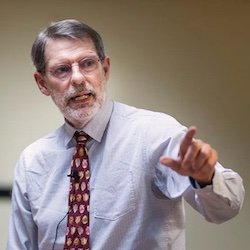According to the U.S. State Department, three-fifths of global GDP, three-quarters of world trade, and 90 percent of official development assistance can be accounted for in 38 countries. Those countries are members of the Organisation for Economic Co-Operation and Development – or OECD. Founded in 1961 and headquartered in Paris, the OECD’s goals include stimulating global economic growth by providing a forum for intergovernmental collaboration. It’s also the focus of this episode of Stats and Stories with guest Steve MacFeely.
How important is it for businesses to increase their profits each year or offer fair wages to workers of all types? How do you think businesses are doing in these areas or, even in other areas, such as operating in a way that is sustainable for the environment and the planet? A Gallup poll of more than 5700 people provided responses to these questions and it was natural to ask how these questions might be connected and whether the pattern of connection differed between groups. Using networks to understand the connection between opinions about how businesses function is the focus of this episode of Stats and Stories with guests Dr. Moinak Bhaduri and Bahareh Zahirodini.
In 2016, the Australian government launched a program it said would make tracking welfare benefits easier. Instead, it falsely told hundreds of thousands of Australians they owed the government money, with some of those individuals taking their own lives as a result. Australia's robodebt tragedy is the focus of this episode of Stats+Stories with guests Noel Cressie and Dennis Trewin.
Journalists are often tasked with making complicated information accessible to a wide audience. Given mere minutes or inches to communicate information that might have taken a researcher pages to explain. Financial data can be particularly tricky to translate as it can require not only a comfort level with numbers but also some understanding of financial markets or economic principles. Reporting on financial information is the focus of this episode of Stats+Stories with guest Alan Smith.
What is the best way to support people living in extreme poverty? Could unconditional cash transfers and universal basic income be viable options? How can we know if such programs will work? Today's episode of stats and stories focuses on addressing the needs of people living in extreme poverty with Miriam Laker.
With Brexit and the United Kingdom’s severing of many formal connections to the European Union have come economic shocks. Trade between the two has become more complicated. Travel has become more difficult. The labor market could also take a beating because of Brexit and that’s the focus of this episode of Stats and Stories with guest Kristina Sargent.
The collapse of Silicon Valley Bank and Signature Bank in early March left many wondering whether the global financial system was on the precipice of a 2008 style meltdown. Just as the waters seemed to calm after that, UBS stepped in to buy Credit Suisse as that bank collapsed and as we record this regional First Republic Bank seemed to be teetering. The risks inherent to and the regulation of banking is the focus of this episode of Stats and Stories with guest Dr. John Liechty.
The Gilded Age in the U.S. is perhaps best known for the great men who rose to prominence at the time. Men such as John D. Rockefeller and JP Morgan, who made money hand over fist. One of those men Andrew Carnegie was not only a shrewd businessman, he was also a shrewd statistician of sorts. His legacy is the focus of this episode of Stats and Stories with guest Christopher Tong.
The issue of income inequality is one Americans continually wrestle with the COVID 19 pandemic bringing to light how housing, health, and general wellbeing are impacted by the unequal distribution of wealth. Income inequality in the United States is the focus of this episode of Stats and Stories with guest Joseph Gastwirth.









